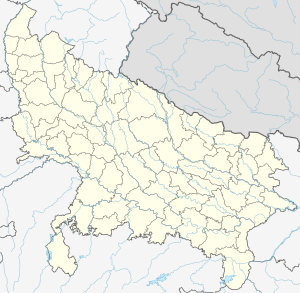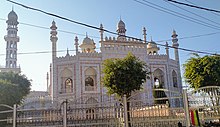| This article needs additional citations for verification. Please help improve this article by adding citations to reliable sources. Unsourced material may be challenged and removed. Find sources: "Masjid-e-Rasheed" – news · newspapers · books · scholar · JSTOR (April 2024) (Learn how and when to remove this message) |
| Masjid-e-Rasheed | |
|---|---|
 | |
| Religion | |
| Affiliation | Sunni Islam |
| Governing body | Majlis-al-Shura |
| Location | |
| Location | Deoband |
| Country | India |
 | |
| Geographic coordinates | 29°41′53.9″N 77°40′32.9″E / 29.698306°N 77.675806°E / 29.698306; 77.675806 |
| Architecture | |
| Architect(s) | Abdul Khaliq Madrasi |
| Type | Congregational mosque |
| Style | Indo-Islamic, Mughal modern |
| Date established | 14 April 1986 |
| Construction cost | |
| Specifications | |
| Capacity | 20,000 |
| Length | 120 metres (390 ft) |
| Width | 60 metres (200 ft) |
| Dome(s) | 1 |
| Minaret(s) | 2 |
| Minaret height | 54.86 metres (180.0 ft) |
| Materials | Makrana marble |
| Website | |
| darululoom-deoband | |
Masjid-e-Rashid (Urdu: مسجد رشید), also known as Jame Rashid Mosque, Masjid-e-Rashidiyah, and Taj Masjid, is a mosque located in the compound of Darul Uloom Deoband in the Saharanpur district of the Indian state of Uttar Pradesh. This mosque is named after Rasheed Ahmad Gangohi, the second patron of Darul Uloom Deoband. This mosque has been described as the most beautiful mosque of the Indian subcontinent.
History
The most distinct and noticeable is the Masjid Jam-e-Rashid. This beautiful mosque with its attractive dome and majestic minarets soaring high attracts visitors. At first glance, one can assume it to be built at the time of Islamic arrival. The vast grounds, long galleries on either side of the central gate and ample space outside make it all the more attractive.
On a moonlit night, the white stone tiles used in the mosque give a sight of Taj Mahal which tempts visitors to sit there for some time. A small but neat pond and a carefully arranged flower garden outside make it extremely beautiful. Leave alone students, there are always a large number of people who come to see the mosque from far and wide.
When the administration of Darul Uloom decided to build this mosque, they had not even imagined that the mosque would turn out to be so beautiful, but as soon as the construction started, the community started donating an unexpected amount, due to which they had to change the earlier plan. However, it took 20 years and a lot of money to reach the current structure. The mosque has a 120 feet high dome, 180 feet high minarets and five doors. It has space for 20 thousand Namazis at a time.
The late president of Jamiat Ulema-e-Hind Asad Madani used to do Iʿtikāf (seclusion meditation) with hundreds of his disciples during Ramzan until his death. His son Mahmood Madani has kept on the same.

References
- ^ Bilal, Manzar (5 December 2009). "masjid rasheed information". Two Circles. Retrieved 28 March 2024.
This article about a mosque or other Islamic place of worship in India is a stub. You can help Misplaced Pages by expanding it. |